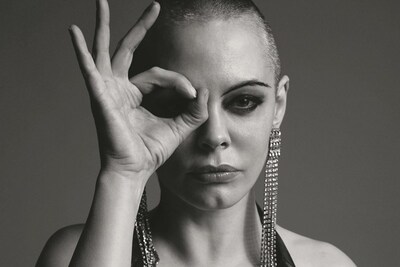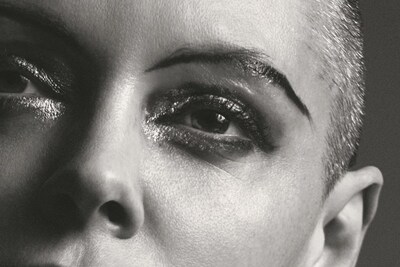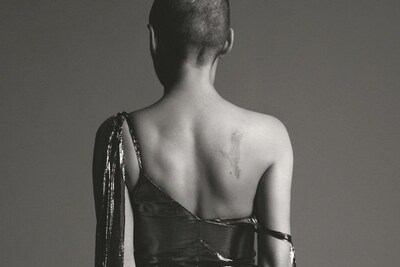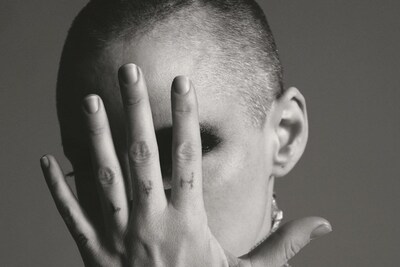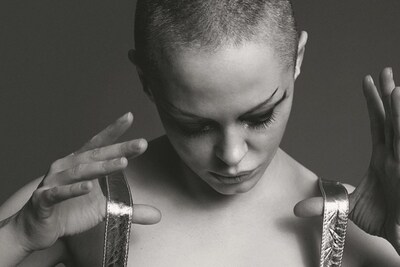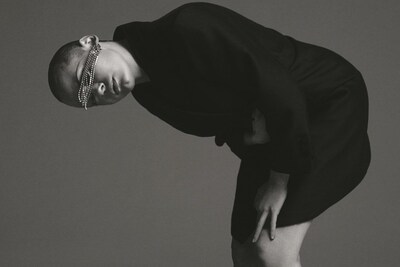For someone whose most important work has been spotlighting the darkest recesses of the film industry, it’s perhaps ironic that Rose McGowan’s story could have been lifted from the pages of a screenplay. Raised in Children of God in rural Italy – a cult that regarded sex, regardless of age or familial relationship, as an expression of love towards God – she eventually escaped to America only to be swept up in a new mania, one which prioritised youth, beauty and celebrity above all else.
Not long after her arrival, McGowan transformed herself from wayward teen into self-taught actress, going on to star in some of the 90s and 00s most seminal films – Scream, JawBreaker, The Doom Generation and Grindhouse, among others. Still in her early twenties, she became a darling of the film industry. Unbeknownst to her, these very same successes would ultimately lead to one of the most traumatic experiences of her life. It’s an incident that would define her life’s work thereafter – speaking truth to power, no matter how influential the target.
Having switched sides of the camera – her short film, Dawn, was nominated for the Grand Jury Prize at Sundance – she now works to help others do the same through her books, music and activism. Fresh from her performance at the Audible Live Stage at Wilderness, and ahead of her Planet 9 shows at the Edinburgh Fringe, here she discusses her mission to help us rewire our minds.
“For me, Brave is a hybrid of an autobiography and a motivational book. I’m using my story to encourage others to be brave, to unwire their minds from prescribed thinking.
“It’s a practice I learnt from a very young age. Growing up in Children of God, they were intent on making you believe what they believed. The problem was, like in many religions, their actions didn’t square up with their words. One of the few good things about Children of God was that they really encouraged intellectualism and learning. [But] with all that learning, I didn’t understand why I had to believe in their God. I used to get in trouble all the time. I lit a wall of Bibles on fire, I lit a whole barn on fire. I was mad at being forced to believe something that didn’t make sense to me. I think that experience helped me see how society duplicates cult-like structures of its own. I still remember, on my first day of school in America, they made me hold my hand on my heart in front of the whole class and sing the Pledge of Allegiance. I thought that was bullshit and I still think it’s bullshit. Gender roles, class structures, people think society is somehow different from these cults, but it’s not. If you’re in a structure that doesn’t benefit you because of your race, or gender or income or whatever, you’re basically in a cult.
“Gender roles, class structures, people think society is somehow different from these cults, but it’s not”
“We’re not born gendered, we get gendered around four or five when we go to school. Even though we’re not different, we’re told we’re different – here’s what you can do, here’s what you can’t do. It’s paternal indoctrination, but it’s also schools. Schools are engaged in this programme of making us conform. I’d always been angry at being classified as a girl. The second I shaved my head it led to this glitch in the Matrix. It’s not what a traditional woman is supposed to look like. I’ve been saying the same things for years, but all of a sudden people could hear it. Just by me not looking like a traditional woman.
“It’s been said that I’ve said I’m non-binary. But what I mean by that is that I’m non-binary of thought. If people place value in labels because it gives them a sense of community, go right ahead. I have great respect for people who fight for their identity. It’s just not my thing, to be labelled, to be a part of a group. I’ve had queer relationships, I’ve had non-traditional relationships, but I just want to be myself. I embrace non-binary thought. It’s a theme that runs through all my work – my performances, my book, my music, my film-making – how we need to unwire our minds. How we should strive for freedom from the cult.
“The film I directed, Dawn, is about what happens to young girls when they get sent out to the world with only politeness to shield them. Spoiler: it’s no shield at all. They’re forced over and over by the power structure to not upset the apple cart. And I’m here to say, upset it. I survived it. So can you.
“That’s why I created Planet 9, it’s movement-based but it blends projection and the physical body and music and spoken word. Hollywood is a particularly dangerous cult because it gives us a mirror which distorts how we see ourselves. I don’t want to look in that mirror, I want to look in my own. Planet 9 is about having less earthbound thoughts.
“Hollywood is a particularly dangerous cult because it gives us a mirror which distorts how we see ourselves. I don’t want to look in that mirror, I want to look in my own”
“We sit down and watch these films with our brains open and it becomes a messaging system for the mind. You can still enjoy movies, but just look at what they’re telling you. See it for what it is, recognise the models it’s forming in your brain. Recognise that most films are telling you what men want. Women in Hollywood support the male-dominated power structure too. I just got a script sent to potentially direct, it was written by a woman and the first section describes one of the characters as ‘She’s Victoria’s Secret. She’s perfect.’ Haha. Are you kidding? Don’t participate in this bullshit because it’s toxic.
“My father was a cult leader, I would watch him wire people’s minds and he was really good at it. And I know how to unwire them. I’m really good at that. I don’t do it for personal gain. It’s a strange compulsion. It’s not easy. It’s incredibly isolating. There’s not a lot of reward for it, but you know, I’m playing for history.
“When I was going through the whole Weinstein fight, that was just a nightmare. It almost snapped my brain. It took every ounce of strength that I had. I did what I came to do. I came to take out the trash and to push the reset button on society. How we look at each other. How we interact. The role of power abuse and how it affects all of us. It affects men too, not the predators, they’re totally different, but ordinary men get put in an emotional straitjacket and they get hurt and they replicate that hurt. So many people have been molested, so many people have been abused, people have such shame about stuff that’s been done to them as kids and I’m just here to say it’s not your fault. It doesn’t make it a pleasant conversation, but sometimes we have to have unpleasant conversations.
“After Weinstein there was an avalanche of all these people, the public saw how far this stretched. And for me, I was like a walking trigger. I didn’t realise this until after I wrote my book, but I would think back to moments that I’d always thought of as sexual experiences. We have to look at that dirt under your nails to get it clean. It doesn’t make it a good time, but it is necessary because otherwise we’re just shoving it down shoving it down shoving it down and then repeating it.
“We just need to remember that sometimes you can cut off the head, you don’t have to nibble at the ankles of power”
“I was doing an interview in Berlin and the sound guy put his microphone down and he said: ‘You’re the one that lays on barbed wire, so others can walk on your back.’ Barbed wire is not fun, especially when you have a lot of trauma. When my book tour started that’s when the hashtag kicked off, and everyone would ask me about it, in every interview. They wanted to know about the hotel room in minute detail, and I didn’t realise what a traumatising effect it was having on me. Constantly revisiting that place. People don’t see the bigger picture, they focus on the salacious aspects of what happened. It’s like no, this happened to me. It’s happening to so many of us. People who have survived so much already get dragged through the mud. By women too, it’s despicable. I think it’s maybe because if they looked at their own lives, their brains would pop open. We should be trying to restore the dignity of abused people, not degrade them simply because they looked up and said the sky is blue. You get punished for speaking the truth.
“I do think things are improving. A lot of men come up to me and thank me or say it’s really cool what you’re doing. People probably wouldn’t expect that. Older men, they always do the daughter thing, ‘Oh, I have a daughter...’ I’m like you should care even if you didn’t have a daughter, but it’s still an improvement. We can get to the other side of this. Get to a place culturally where it’s a new normal. When you grow up, sometimes your legs hurt, but you know what? You get taller. We just need to remember that sometimes you can cut off the head, you don’t have to nibble at the ankles of power.”
Rose McGowan’s Planet 9 takes place at the Edinburgh Fringe from August 15 – 18, 2019.
Hair: Mark Hampton at Julian Watson Agency using Toni & Guy. Make-up: Maki Ryoke at Tim Howard Management using M.A.C. Photographic assistant: Andy Harrington. Fashion assistants: Hester Hodde, Rasaan Wyzard. Hair assistant: Brittany Mroczek. Make-up assistant: Mikako Shojima. Production: Julie Velut at Artistry, David R Lipford. Production assistant: Simone Green.
